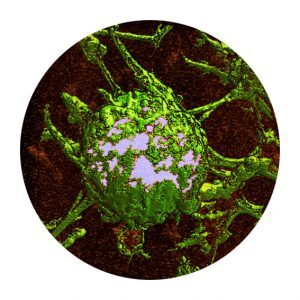Intracellular membrane trafficking in the nervous and neuroendocrine systems
Stéphane GASMAN & Nicolas VITALE

 ⇨ Teams
⇨ Teams Presentation
Functioning of the nervous and neuroendocrine systems is based on the release of informative molecules thanks to various tightly regulated membrane trafficking processes (exocytosis, endocytosis, vesicular transport). 
Our research aims at deciphering the molecular mechanisms regulating these trafficking events and at unravelling their dysfunction associated with important pathologies (mental retardation, neurodegenerative diseases, neuroendocrine cancers, obesity…).
Using neurons, neuroendocrine cells and ependymal cells, we are particularly studying the mechanisms by which different lipids and proteins control the life cycle of vesicles, starting from biogenesis to membrane fusion through their intracellular transport.
> Formation of endocytosis sites
Sylvette CHASSEROT-GOLAZ
Nicolas VITALE, Emeline TANGUY
> Neuroendocrine secretions and tumors
Stéphane GASMAN
> Transport of metabolic hormones to the brain
Stéphane ORY, Stéphane GASMAN
> V-ATPase and vesicular maturation
Nicolas VITALE

(Ph. D.)
Metabolic diseases, such as obesity, pose a significant public health challenge today, with poor dietary habits, particularly the excessive consumption of saturated fatty acids (SFAs), emerging as a key risk factor. These conditions are linked to neuroinflammation in various hypothalamic regions, including the median eminence, and a diminished response to leptin, an anorectic hormone responsible for triggering satiety signals. In my research project, I aim to identify the role and mechanisms of leptin transport by microglia, specifically examining whether SFAs contribute to a functional alteration of the hormone. Through investigations into the transit of leptin through microglia in the median eminence, I use primary cultures of microglia and fluorescent leptin, employing diverse imaging techniques to pinpoint the intracellular compartments involved. My ultimate goal is to comprehend the impact of leptin transport on the inflammatory profile induced by microglia, both with and without exposure to SFA treatment.

(Ph. D.)
My thesis project on Alzheimer’s disease and type 2 diabetes lies at the interface between chemistry and biology and is funded by the CNRS MITI 80′ program. Both diseases involve excessive production of peptides capable of self-assembly into fibers which are associated with a certain degree of cellular toxicity. These are amyloid-beta peptides in Alzheimer’s and amylin in type 2 diabetes. By carrying out co-assembly kinetics studies on the formation of co-aggregates, I’m investigating the impact that these two peptides can have on each other. In parallel, structural studies will enable us to observe and compare the fibers formed. The impact of these co-aggregates on organotypic cultures of mouse hippocampus is evaluated to study their toxicity by immunocytochemical approaches and by measuring neuronal network activity by MEA. This thesis aims to establish whether amylin does indeed act as a link between these two pathologies and is co-directed by the Laboratoire de Chimie de Coordination in Toulouse and INCI in Strasbourg.

(Ph. D.)
The role of lipids, major components of cellular membranes, in the release of neurotransmitters and hormones is still poorly understood, mainly because of a lack of efficient tools. My work is based on the usage of optogenetic tools and ‘click chemistry’ to, on one hand, direct lipid metabolism enzymes to a specific membrane compartment and, on the other hand, introduce ‘clickable’ lipids into membranes allowing the grafting of various functional groups. By employing these innovative tools on bovine chromaffin cells, combined with advanced microscopy approaches or electrochemistry, I explore the pleiotropic roles of lipids in neurosecretion with unprecedented spatial and temporal precision.






















